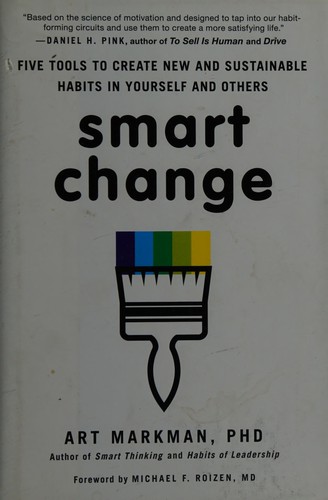275 pages
English language
Published July 14, 2014 by Perigee.
five tools to create new and sustainable habits in yourself and others

275 pages
English language
Published July 14, 2014 by Perigee.
"An insightful guide that shows how habits of behavior are formed, and how we can transform bad habits into positive behaviors in ourselves and others. Smart Change explores the psychological mechanisms that form and maintain habits in individuals and groups and offers real, accessible and actionable advice for changing habits. In an engaging narrative, Markman covers a wide range of habits, from individual behaviors like eating better and exercising regularly to work-related behaviors such as learning effectively and influencing customers' purchases. He proposes that there are five effective tools to help individuals change behavior and to help people influence the habits of the people around them: 1. Tame the "Go" system: Identify the triggers of habits, replace old behaviors with new ones and generate specific plans to deal with obstacles. 2. Harness the "Stop" system: Learn to deal with stress and other factors that hinder the development of new and …
"An insightful guide that shows how habits of behavior are formed, and how we can transform bad habits into positive behaviors in ourselves and others. Smart Change explores the psychological mechanisms that form and maintain habits in individuals and groups and offers real, accessible and actionable advice for changing habits. In an engaging narrative, Markman covers a wide range of habits, from individual behaviors like eating better and exercising regularly to work-related behaviors such as learning effectively and influencing customers' purchases. He proposes that there are five effective tools to help individuals change behavior and to help people influence the habits of the people around them: 1. Tame the "Go" system: Identify the triggers of habits, replace old behaviors with new ones and generate specific plans to deal with obstacles. 2. Harness the "Stop" system: Learn to deal with stress and other factors that hinder the development of new and positive habits. 3. Optimize your goals. Determine the course of behavior change and how to successfully incorporate those changes for the long term. 4. Manage your environment: Change your surroundings to dramatically reduce poor behavior and habits. 5. Engage your Neighbors: To affect other people's behavior, understand the shared culture that creates a mutual dependency, and allows neighbors and colleagues to have a profound positive influence on the behavior of other members of their community"--
"You can transform bad habits into positive behaviors in yourself and others. Smart Change explores the psychological mechanisms that form and maintain habits in individuals and groups and offers real, accessible, and actionable advice for changing habits. In this engaging narrative, Dr. Markman, whose previous book Smart Thinking showed us how the mind works to think and act smarter, covers a wide range of habits, from individual behaviors like eating better and exercising regularly to work-related issues like learning effectively and influencing customers' purchases. As insightful as it is practical, Smart Change explains how five effective tools can help us change our own destructive behaviors and influence the habits of others: 1. Tame the "Go" system: Identify the triggers of habits, replace old behaviors with new ones, and generate specific plans to deal with obstacles. 2. Harness the "Stop" system: Learn to deal with stress and other factors that hinder the development of new and positive habits. 3. Optimize your goals: Determine the course of behavior change and how to successfully incorporate those changes for the long term. 4. Manage your environment: Change your surroundings to dramatically reduce poor behavior and habits. 5. Engage your neighbors: To affect both your own and other people's behavior, understand the shared culture that creates a mutual dependency, and allows neighbors and colleagues to have a profound positive influence on the behavior of other members of their community"--